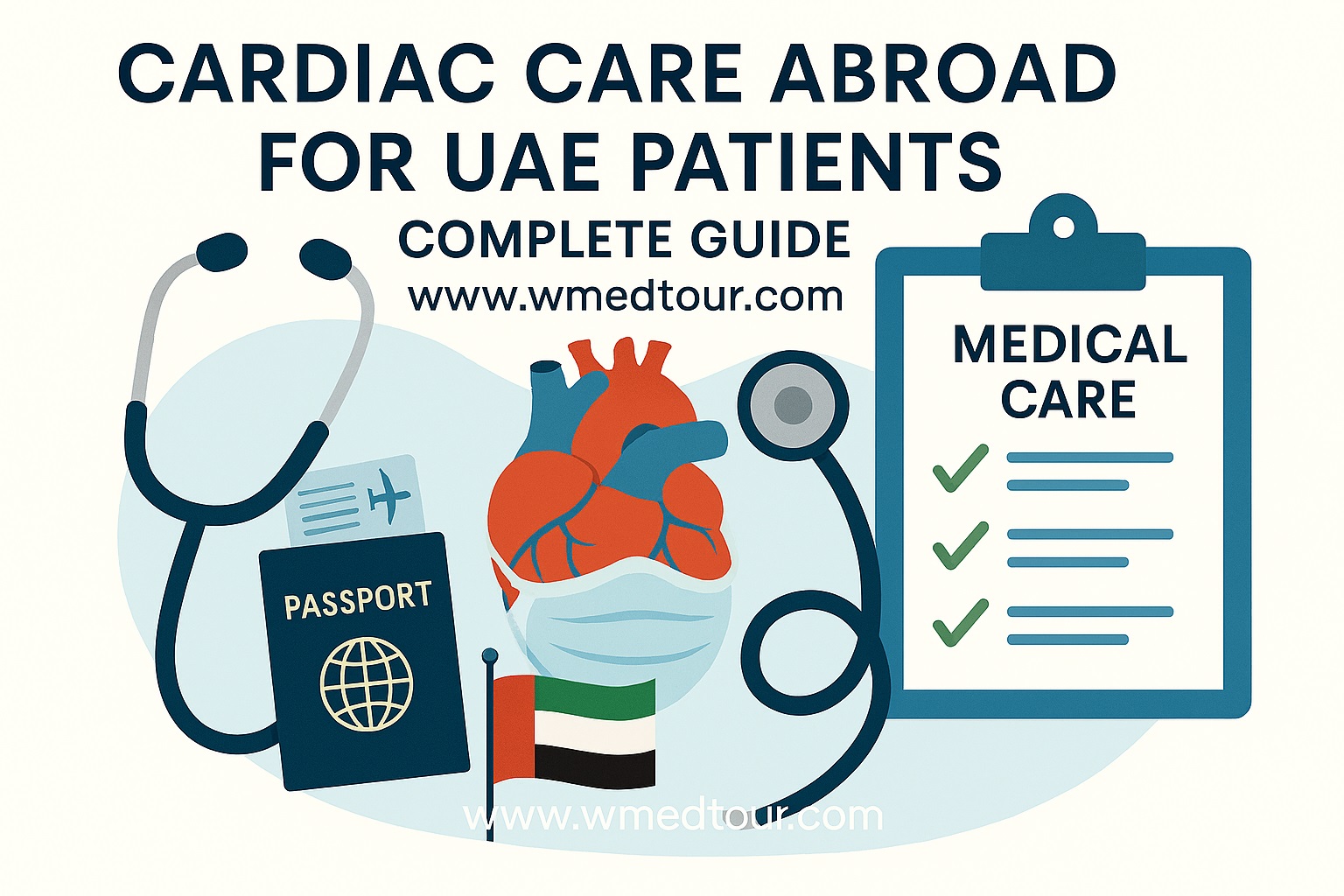A Complete Guide to Cardiac Care for Arabic Emirates Patients
Navigating cardiac care for Arabic Emirates patients can often be a complex and overwhelming journey. In fact, many individuals find that seeking specialized treatments abroad, through what is known as medical tourism, is a compelling and viable option. This comprehensive guide will explore the ins and outs of cardiac care abroad, providing a step-by-step approach to planning your trip and highlighting top global destinations. By the end, you will feel more confident in making the best decision for your health.
Why Consider Medical Tourism for Cardiac Care?
Many residents and citizens of the UAE choose to seek cardiac treatment outside the country for a variety of important reasons. First and foremost, while the UAE offers excellent healthcare, some highly specialized or advanced procedures may not be widely available. This is particularly true for rare conditions or the most cutting-edge surgical techniques. As a result, patients often seek out international hospitals that are at the forefront of medical innovation.
Furthermore, the cost of complex cardiac procedures can be a major consideration. Although the UAE has world-class hospitals, the price of treatment, especially for those without comprehensive insurance, can be a significant barrier. Therefore, many people turn to countries where high-quality care is available at a more affordable cost. This economic advantage, coupled with access to leading specialists, makes medical tourism an appealing choice for cardiac care for Arabic Emirates patients.
Reduced Wait Times and Patient-Centric Care
Additionally, medical tourism can provide an opportunity to bypass long waiting lists that may exist for certain procedures. This is a critical factor for patients with time-sensitive conditions. In contrast to a sometimes lengthy local process, many international hospitals have dedicated services for foreign patients, ensuring that appointments and treatments can be scheduled efficiently. The rise of medical tourism for cardiology has also led to a more patient-centric approach, where hospitals and facilitators prioritize a smooth and stress-free experience from start to finish. In short, the combination of specialized care, affordability, and reduced wait times makes it an attractive option.
Understanding Your Cardiac Treatment Options Abroad
Before you begin planning, it’s crucial to understand the range of cardiac procedures available. These vary from common interventions to highly complex surgeries. For instance, common diagnostic procedures include ECG, echocardiograms, and stress tests, which are fundamental for initial assessment. Similarly, less-invasive interventional cardiology procedures like angioplasty and stent placement are used to clear blocked arteries. They are performed via a catheter, resulting in shorter recovery times.
Common Surgical Procedures
A common surgical procedure is Coronary Artery Bypass Grafting (CABG), often called “bypass surgery,” which reroutes blood flow around a blocked artery. Other major surgeries include heart valve repair or replacement and heart transplants. The choice of procedure depends on your specific condition, which a qualified cardiologist can determine. Thus, a detailed consultation is always the first step. For more on heart surgery, you can visit the Royal Papworth Hospital website.
Planning Your Medical Journey: A Guide for Cardiac Care for Arabic Emirates Patients
Planning a medical trip can seem daunting, but breaking it down into manageable steps makes the process much smoother. Here’s a detailed guide to help you navigate your journey with confidence.
Step 1: Initial Research and Consultation
First and foremost, you need to conduct thorough research. Begin by gathering all your medical records, including diagnostic reports, test results, and a summary of your health history. Next, identify potential medical destinations and hospitals specializing in the specific cardiac procedure you need. You can use online resources and medical tourism facilitators to help you find accredited hospitals and renowned surgeons.
It is important to note that many top hospitals abroad have dedicated international patient departments. In fact, they offer tele-consultations, allowing you to get a second opinion from a specialist before you travel. You can get an idea of the types of services available on websites like the Cleveland Clinic Abu Dhabi and understand why people travel for treatment.
Step 2: Choosing a Medical Tourism Facilitator
A medical tourism facilitator can be an invaluable partner in this process. These companies specialize in connecting patients with the right hospitals and managing all the logistics of the trip. They can assist with everything from appointment scheduling to visa arrangements and even accommodation for you and your family.
In addition, they provide a sense of security and guidance, which is particularly important during a stressful time. Therefore, look for a facilitator with a strong track record and good reviews. A reputable facilitator will be transparent about costs and will have a network of trusted hospitals. For best results, consider visiting a specialized platform like wmedtour.com to explore your options. You can also review their FAQ section for answers to common questions about medical travel.
Step 3: Financial and Legal Preparations
Before confirming your plans, it is vital to understand the financial aspects. This includes the total cost of the procedure, hospital stay, post-operative care, and travel expenses. Always ask for a detailed cost estimate from the hospital or facilitator. It’s also important to check if your insurance policy covers treatment abroad.
Moreover, be sure to inquire about visa requirements and any other legal documents needed for both you and your companion. You may need a medical visa, which a medical report from your cardiologist can support. For more information on health and travel, you can consult sources like the UK Government’s advice for UAE travelers.
Step 4: The Treatment and Recovery Process
With all arrangements in place, you can proceed with your travel. Ensure you have all necessary documents, including your passport, visa, and a copy of your medical records. Upon arrival, you will typically be met by a hospital representative or a facilitator. Your treatment will begin with a thorough pre-operative assessment.
Following your procedure, you will stay in the hospital for a period of time to recover under the care of medical professionals. The duration of your stay depends entirely on the type of procedure you have and your recovery progress. Recovery is a crucial phase of your medical journey, which can take weeks or even months. To find out more about the general recovery timeline for a bypass graft, consult the NHS website.
Global Destinations for Top-Tier Cardiac Care for Arabic Emirates Patients
Choosing the right destination for cardiac care for Arabic Emirates patients involves weighing factors such as quality of care, cost, and travel logistics. Here is a comparison of some of the leading countries for medical tourism for cardiology.
| Destination | Key Advantages | Estimated Cost Comparison | Leading Hospitals |
|---|---|---|---|
| Iran | Highly skilled surgeons, state-of-the-art facilities, and significantly lower costs. No waiting lists. Moreover, the proximity to the UAE makes travel convenient. | $$ (Very affordable) | Shahid Rajaei Heart Hospital, Tehran Heart Center |
| Germany | Renowned for medical technology and a strong track record in complex surgeries. English-speaking staff are common. They follow strict quality control standards. For more information, visit German Heart Centre. | $$$$ (High) | German Heart Centre Berlin, University Hospital Heidelberg |
| Turkey | A growing hub for medical tourism with modern facilities, competitive pricing, and experienced specialists. They offer comprehensive treatment packages. To learn more, visit Medical Park’s cardiology page. | $$$ (Moderately affordable) | Medical Park Hospitals Group, Acibadem Hospitals Group |
| UK | Home to some of the world’s leading research hospitals and a high standard of care. This is a top choice for complex or rare heart conditions. Find out more at the Barts Heart Centre website. | $$$$$ (Very High) | Royal Papworth Hospital, Barts Heart Centre |
The Rising Appeal of Iran for Cardiac Care
Iran has emerged as a significant player in the global medical tourism market, particularly for cardiac care. A major reason for this is the exceptional quality of its medical professionals and infrastructure. Iranian heart surgeons are highly trained, many with international experience, and hospitals are equipped with the latest technology. For example, Tehran Heart Center and Shahid Rajaei Heart Hospital are recognized as leading cardiac institutes in the region. Shahid Rajaei Cardiovascular, Research and Training Center has over 573 active beds and uses advanced equipment.
Furthermore, Iran’s healthcare system is known for its high success rates in complex heart surgeries and interventional procedures. This is a testament to the expertise and dedication of its medical teams. The cost-effectiveness of treatment in Iran is another powerful draw for cardiac care for Arabic Emirates patients. The price of major procedures, such as open-heart surgery, can be a fraction of the cost in Western countries, or even in the UAE. This does not, however, come at the expense of quality.
The combination of world-class expertise and affordability has made Iran a top choice for patients seeking value. Finally, the cultural and geographical proximity to the UAE simplifies travel, making the entire process less stressful for patients and their families. To find out more about the best options in Iran, visit wmedtour.com/iran-as-a-medical-tourism-destination.
Important Considerations for UAE Patients
As you plan your medical journey, there are several key factors to keep in mind. First, always verify the credentials of the hospital and the surgeon. You should seek out facilities that are internationally accredited, as this is a strong indicator of quality and safety. Second, it is essential to have a clear understanding of the full cost. Be sure to ask about all potential charges, including follow-up appointments and any unexpected complications. A reputable provider will give you a transparent and detailed breakdown of all expenses.
Logistics and Post-Operative Planning
Furthermore, it is important to understand the typical costs of procedures, such as those listed by PlacidWay Medical Tourism. This will help you find the best value. In addition, think about the logistics of your stay. This includes finding suitable accommodation, arranging local transportation, and having access to an interpreter if needed.
For this reason, a medical tourism facilitator is extremely helpful. They can handle all these details, allowing you to focus on your health and recovery. Finally, remember to plan for your post-operative recovery. Discuss your follow-up care plan with your doctor before you leave the hospital, and ensure you have a reliable way to communicate with them once you are back in the UAE. This is a key component for successful long-term health. Ultimately, a thorough plan ensures a smooth experience for cardiac care for Arabic Emirates patients.
Finding the Right Cardiac Hospital Abroad
Choosing a cardiac hospital abroad requires careful consideration to ensure you receive the best possible care. Firstly, check for international accreditations such as Joint Commission International (JCI) or other globally recognized bodies. These accreditations indicate that the hospital meets stringent international standards for patient care and safety.
Evaluating Hospital Experience and Technology
Additionally, it is important to look at the hospital’s specific experience with your required procedure. Ask about their success rates, patient testimonials, and the number of procedures they perform annually. A high volume of procedures often indicates a high level of expertise. Moreover, inquire about the technology and equipment they use, as this can directly impact the quality of your care. According to IranHRC, Iran is among the top 10 countries for cardiovascular care.
Assessing the Medical Team and Patient Support
Another crucial factor is the hospital’s team. Research the surgeons’ qualifications and experience. Many leading surgeons will have profiles online, detailing their specializations and professional history. Furthermore, consider the level of support for international patients. A dedicated international patient office that provides multilingual staff, visa assistance, and concierge services can greatly reduce stress. For example, some hospitals offer dedicated private wards for international patients.
Finally, look at the comprehensive nature of their services, from pre-travel consultations to post-operative rehabilitation. This holistic approach ensures a seamless and supportive patient experience for cardiac care for Arabic Emirates patients.
Conclusion
For cardiac care for Arabic Emirates patients, the world of medical tourism offers exceptional opportunities for high-quality, specialized, and often more affordable care. By doing your research, working with a trusted facilitator, and planning meticulously, you can ensure a successful and stress-free medical journey. Ultimately, places like Iran have proven to be a compelling option, combining high-quality medical expertise with cost-effectiveness. Therefore, to begin your journey and explore your best options for cardiac care, we highly recommend you visit wmedtour.com/contact-us and get a free consultation today.
Frequently Asked Questions About Cardiac Care Abroad
You can find a wide range of cardiac procedures abroad, from non-invasive diagnostic tests to complex surgeries. These include, but are not limited to, coronary artery bypass grafting (CABG), angioplasty and stenting, heart valve repair or replacement, arrhythmia treatments, and pediatric cardiology interventions. Many facilities also offer advanced procedures like transcatheter aortic valve implantation (TAVI) and hybrid revascularization.




